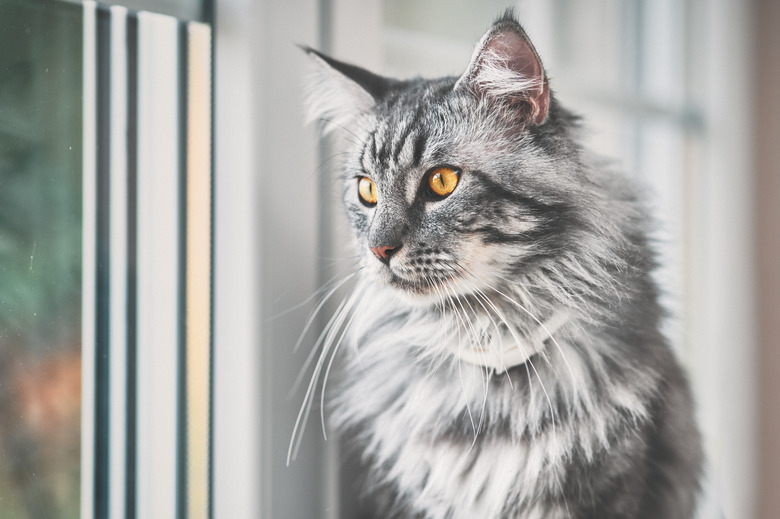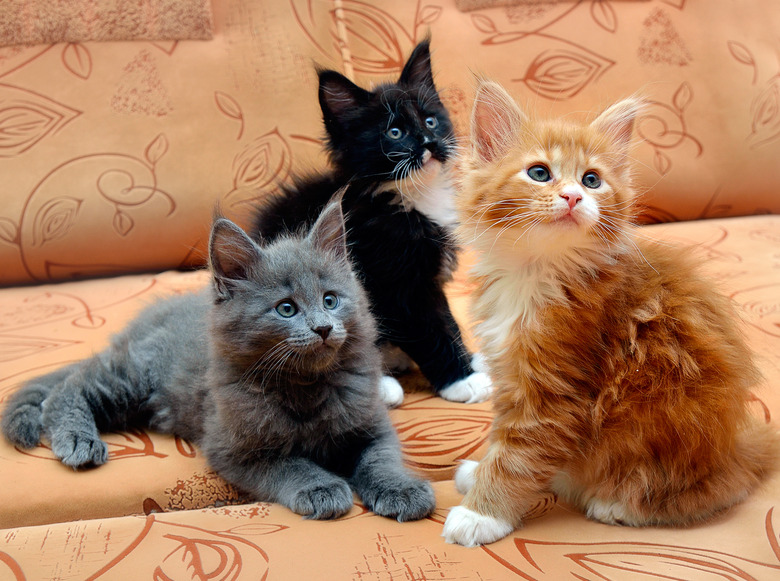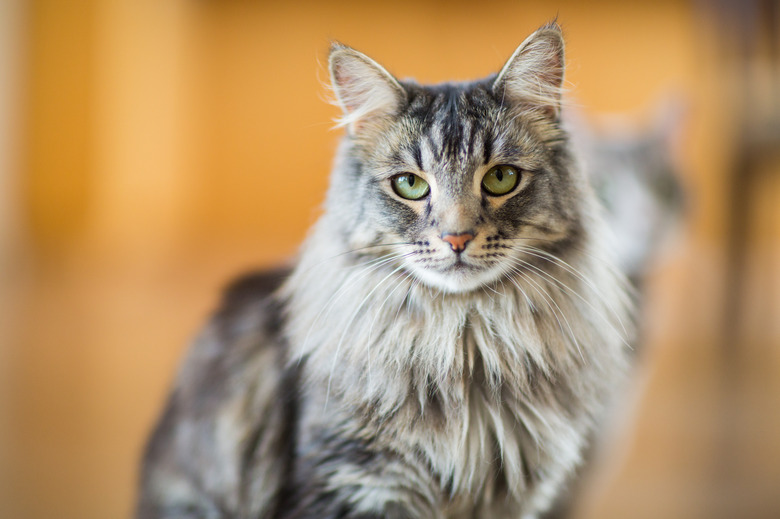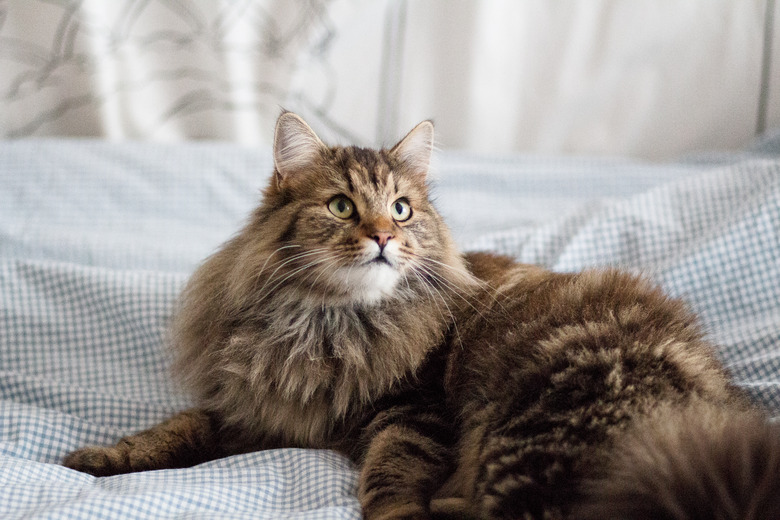Maine Coon Cat Breed Characteristics
Maine coon quick facts
Maine coon quick facts
Length: 12 – 18 inches
Weight: Females: 12 – 15 pounds, males: 18 – 22 pounds
Lifespan: 12.5 years or more
Coat length: Long
Coloring: Most coat colors and patterns (except for pointed coloration)
Grooming needs: Medium
Friendliness: Breed alone is not an accurate predictor of individual cats' personalities. However, Maine coon cats are generally regarded as gentle, friendly, and intelligent.
Maine coon cats are large, longhaired cats and an incredibly popular housecat breed. Sometimes referred to as gentle giants, these cats are friendly and affectionate and an active part of your family. They have many unique traits including the way they talk. Unlike the meow common to most cats, Maine coon cats tend to trill or chirp. Carefully consider the breed's personality and care requirements before bringing a Maine coon kitten into your home.
Maine coon cat history
Maine coon cat history
This cat breed is native to North America and is named after the state of Maine where it was first recognized as a breed — and is the state's official cat. Stories abound claiming that the cat was created as a cross between a domestic cat and a raccoon. This is an entertaining story, but biologically impossible. Another legend claims the Maine coon breed descended from one of the cats brought over to America by Marie Antoinette.
The most likely case is that the breed is a cross between a domestic shorthair cat and a longhair cat breed. The Maine coon's physical traits show off their ruggedness and ability to survive in the cold New England climate. They have shaggy coats and bushy tails and tufted paws that keep them warm in the cold and snow. The popular cat breed is often crowned Best Cat at Cat Fanciers' Association cat shows.
Maine coon cat personality
Maine coon cat personality
Many describe the Maine coon cat's personality traits as being dog-like. They are gentle, friendly, and intelligent. They tend to be quite social with all members of the family including other pets. Not all house cats of this breed are lap cats who constantly want to cuddle. Yet, they do tend to be affectionate and want to be in your company — if not in physical contact with you.
Adult Maine coons are less active than Maine coon kittens, but they do continue to be playful throughout their lives. Continuing their dog-like tendencies, these cats can be trained to walk on a leash, follow basic commands, and even walk on a leash. They also generally enjoy the water and may play in the sink or shower. They are good swimmers and their coat is water resistant, so some cats may even take a liking to the bathtub.
Maine coon cat lifespan and health issues
Maine coon cat lifespan and health issues
The purebred Maine coon cat breed tends to live into their teens, with healthy cats living 12.5 years or more. As a large cat breed, they do have some problems that may affect their life expectancy and quality of life as they age. Two common joint problems that Maine coon breeders should test for include hip dysplasia and luxating patella, both of which can cause lameness.
Another health problem breeders should test for is hypertrophic cardiomyopathy, a common heart condition in cats that causes the wall of the heart to thicken. The International Cat Association recommends that breeders have both a genetic test and an echocardiogram performed to rule out the presence of the disease. Breeders may also have genetic testing done for spinal muscular atrophy, a disease that affects the neurons and causes muscle wasting, and pyruvate kinase deficiency — a condition that prevents the survival of red blood cells.
Maine coon cat grooming and care
Maine coon cat grooming and care
Maine coon cats have long coats that require regular brushing. The coat has two layers and tends to be longer and thicker around the ruff, underbelly, and britches and shorter on the shoulders and back. The texture of the fur can vary and some cats will have a heavier undercoat while others may have silkier fur. Cats with silkier fur generally need less frequent brushing while some cats of the breed will need to have their coat combed out daily.
Relative to other long-hair cat breeds, Maine coon cats have a coat that is easy to maintain. Some cat owners prefer to have their cats groomed with a lion cut to minimize the grooming needs, but this isn't allowed if you intend to take your cat to cat shows. Check and trim the Maine coon cat's nails approximately every two to three weeks and brush their teeth regularly with toothpaste formulated for cats.
Feed a high-quality, high-protein cat food as recommended by your veterinarian. They typically need less food than you think, eating just 2/3 to 3/4 cups of food each day. Make sure they have constant access to clean water. Be sure to have regular check-ups with your veterinarian and keep the cat up to date on all the recommended vaccinations.
Welcoming a new cat into your home
Welcoming a new cat into your home
Bringing a new cat into the home is an exciting time for your family, but it can be a bit stressful for your kitten or adult cat. Make sure you cat-proof your home prior to the cat's arrival. This includes removing any toxic plants from the home, taking any harmful foods off of the counter and putting them in the refrigerator, and cleaning up any small objects or electrical wires your new cat may enjoy chewing on.
Set up cat food and water dishes and position a litter box filled with clean litter in an easy-to-access and quiet location. Put your cat in a single room when they first arrive to give them some time to adjust to the new environment. If you have other pets in the home, they can have an initial meeting through the door of the designated room.
Give your cat time to adjust and warm up to you on their own terms. Use plenty of positive reinforcement and don't punish the cat or force them to be held or petted. With a bit of time and patience, these gentle giants will soon be active members of your family.



